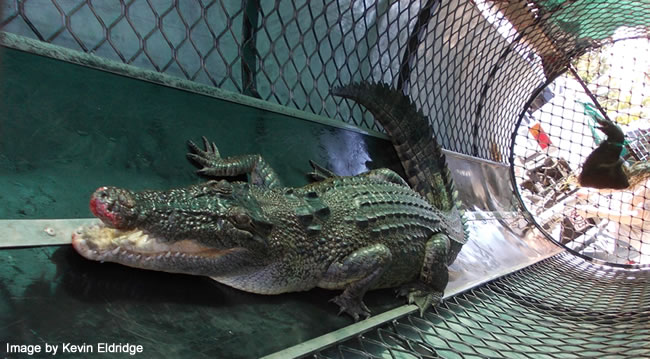Dickson Inlet crocodile caught
Wednesday 24 April 2013
Dickson Inlet crocodile caught

Department of Environment and Heritage Protection rangers have caught and removed a 2.3 metre male crocodile at Dickson Inlet, Port Douglas.
A floating trap was set for the animal on Saturday after EHP received a number of sighting reports and the animal’s presence was confirmed by rangers. The crocodile was in the trap when rangers checked it on Monday.
After assessment, the crocodile will be offered to a registered crocodile farm or zoo.
While EHP believes this crocodile is the one seen in recent reports, if the public observes other crocodiles in the vicinity, these should be reported as soon as possible.
EHP also set a floating trap for a crocodile at Newell Beach on Friday following a number of reported sightings this month.
This crocodile is believed to be 3 to 4 metres in length and has also been observed by rangers.
It is likely that domestic dogs on the beach or in the water are attracting the crocodile in close to the beach.
EHP Manager Wildlife Operations, Mike Devery, said Dickson Inlet and Newell Beach were known crocodile habitats.
“I urge people to take care at Newell Beach and Dickson Inlet and be “Crocwise” in known crocodile habitat.
“In particular, people should not let their dogs swim in waters where crocs are known to live.”
Crocodile sightings can be reported at any time on 1300 130 372 and EHP investigates all crocodile reports it receives. 
Meanwhile, north Queenslanders can have a say on crocodile management in their local area with the establishment of a community advisory group.
Minister for Environment and Heritage Protection Andrew Powell yesterday announced the establishment of the North Queensland Community Advisory Group for Crocodile Management to provide the government with local advice.
“We already have the scientists, now we’re looking for vital input from locals,” Mr Powell said.
“I have asked twelve people including local councillors, local Members of Parliament and north Queensland identities with significant crocodile management experience to become part of this community focused group.
“By including key representatives from the north Queensland community, the government will ensure its approach to crocodile management will be responsive, effective and well informed by local input.”
Mr Powell said the role of the group would be to discuss with the department current and new crocodile issues and to suggest improvements and future management options.
Crocwise behaviour includes:
- Obey croc warning signs
- Don’t swim or let domestic pets swim in waters where crocs may live
- Be aware that that crocodiles also swim in the ocean
- Stand back from the water when fishing or cast netting
- Never provoke, harass or feed crocs
- Never leave food, fish scraps or bait near the water, a camp site or boat ramp, and
- Always supervise children.
